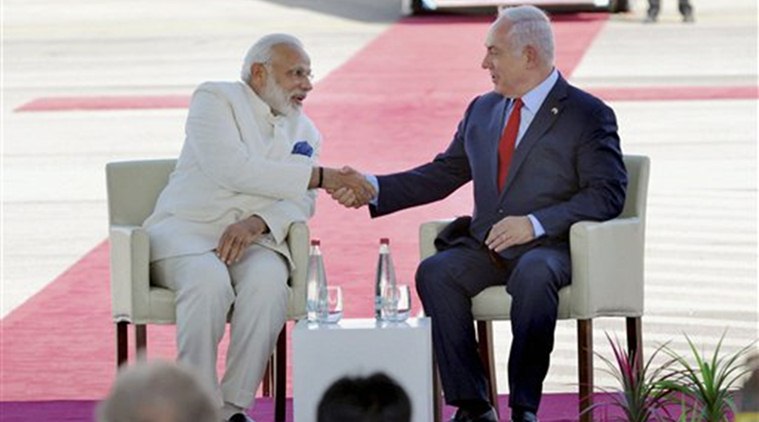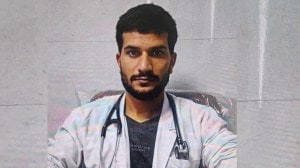Inside a windowless room near the Erez border crossing between Israel and the Hamas-controlled Gaza Strip, 85 km from Jerusalem, Fathi Tobail is a disappointed man. “He should have come to Palestine,” says the 53-year-old, shaking his head. “We believe India has good cooperation with Palestine, and we wanted him to come to Gaza as well,” says Tobail, wearing the traditional keffiyeh.
Tobail, who owns a multimedia firm, is referring to Prime Minister Narendra Modi, who arrived in Israel Tuesday for the first visit to the country by an Indian Prime Minister. Unlike previous visits by three Indian leaders — foreign ministers Jaswant Singh in 2000, S M Krishna in 2012 and Sushma Swaraj in 2016 — Modi’s visit is limited to Israel, and does not include Palestine. Married to an Indian, Tobail says he has stayed in Chandigarh and now produces short films and manages websites in Gaza.

“India can cooperate in the field of electricity. If he had visited Palestine, we would have submitted a request to him about the scarcity of power in Gaza,” he says, pointing to the fan that doesn’t work. On Tuesday morning, there was no electricity, too. “Power cuts are very common in Gaza,” says Tobail.
Story continues below this ad
The one-hour, 20-minute ride to Erez is smooth, on a four-lane expressway, where lush greenery on either side leads to the imposing, concrete crossing at Erez, with a glass facade. On the Israeli side of the immigration facility, a lone woman officer is playing “candy crush” on her cellphone. Two families wait in the lobby, with a little girl chewing on a plastic teddy bear. Photography is not allowed.
The immigration officer takes a hard look at the passport before issuing a stern reminder: “The gates close for foreigners by 3 pm.” Informed that the Israeli foreign ministry had specified 3.30 pm, she corrects herself: “Until 3.30 pm.”
The “other side” lies past the immigration checkpoints through a narrow labyrinth of grey concrete, and a “tuk-tuk” ride through a tunnel-like path, caged with wire and steel. In Gaza, an officer sits under a poster of Yasser Arafat on the wall, and a map of Gaza Strip. Nearby, the Al Awda cafeteria advertises “free WiFi”. The cafeteria also flaunts Bisci chocolate biscuits, date bars, Sirma mineral water and Shuga wet wipes.
Tobail’s office is another taxi ride away, past Palestinian immigration, controlled by Hamas. At the office, journalist Suhada Hammad, 25, echoes the disappointment.
Story continues below this ad
“We expected that he will come to Palestine, and to Gaza. He should have come to see the situation here, talk to us about our issues, lives. Unfortunately, this time, it has not happened. Another time, we hope,” says Suhada, wearing a blue dress and a head scarf with yellow-and-blue floral prints.
Then there’s Ali Mohammad Abushbak, 25, who is keen on getting an admission to Jamia Millia Islamia’s mass communications programme. “It’s very sad that Modi did not come to Palestine. A lot of people believe the story of Israel, but what about the Palestine story? We are feeling discriminated by this approach of the Indian government,” says Ali.
Israeli officials say that Hamas, which controls Gaza, is a terrorist organisation. According to Mark Sofer, a senior official in Israel’s foreign ministry, there is no difference between Lashkar-e-Toiba and Hamas.
Israel’s concerns resonate in the security checks on the way back. Here, bags are emptied completely — pens, keys, handkerchieves, headphones and open laptops are placed on a large plastic tray, so that each item is visible. Then, there are body scanners and more security checks.
Story continues below this ad
A Swedish woman, who works for a Norwegian humanitarian organisation in Gaza, is worried that security personnel would confiscate the Swiss knife gifted by her husband. But as her tray arrives, her face lights up — the knife is there.
Outside, a blue poster with an image of one hand clasping another, reads: “www.helpmegaza.com, Call @ 1800-800-319”.

 Tel Aviv :Prime Minister Narendra Modi and Israeli Prime Minister Benjamin Netanyahu during welcome ceremony upon arrival in Ben Gurion airport near Tel Aviv, Israel, Tuesday. PTI Photo
Tel Aviv :Prime Minister Narendra Modi and Israeli Prime Minister Benjamin Netanyahu during welcome ceremony upon arrival in Ben Gurion airport near Tel Aviv, Israel, Tuesday. PTI Photo






